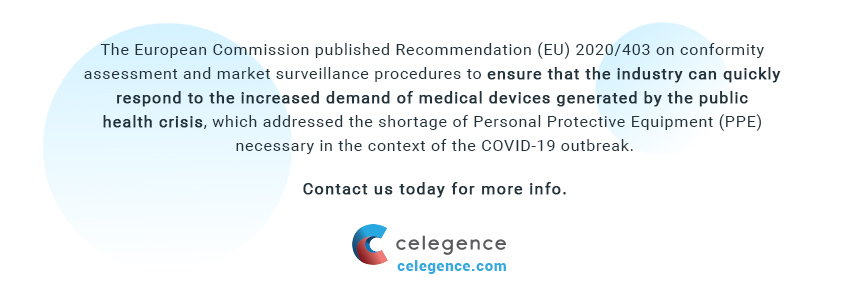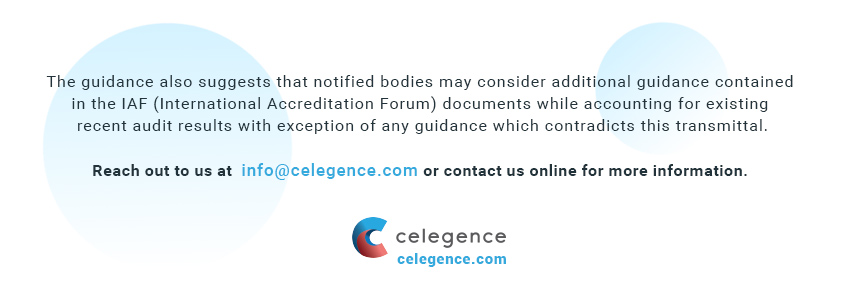
COVID-19 Impact on the Medical Device and Diagnostics Industry
The SARS-CoV-2 pandemic and the unprecedented nature of this health crisis poses significant strain to the global life sciences industry. Amid uncertainty, both governing and regulatory bodies are working nonstop to ensure guidelines are set in place to aid the medical device industry in reacting to this crisis.

Claim Your Free EU MDR Checklist Now!
Make sure you and your business are compliant with the new EU MDR. Get our 23 page checklist for actionable technical documentation requirements.
Deferral of EU MDR Enforcement Due To COVID-19
In order to prioritize the health sector’s fight against COVID-19, and as detailed in our MDR Timelines update, the European Commission released a proposal on April 3rd, 2020 that it would defer the enforcement of the EU Medical Devices Regulation (MDR) for a year effective from May 26th, 2020. As for the In Vitro Diagnostic Regulation (IVDR), which will be applicable from May 26th, 2022, the Commission stated that the respective stakeholders will have to implement the new IVDR within the fixed transition timelines.
European Commission Statement Re EU MDR and Coronavirus
The official statement released by the Commission stated:
“As the coronavirus crisis increases demands for certain vital medical devices, it is crucial to avoid any further difficulties or risks of potential shortages or delays in the availability of such devices caused by capacity limitations of authorities or conformity assessment bodies related to the implementation of the Medical Devices Regulation.”
The Commission further stated that with a view to avoid disruption of the device market at such a critical time, the year-long delay will not alter the substance of MDR. Moreover, the delay will “not impose new obligations on the concerned parties. It primarily aims at providing, for exceptional reasons in the context of the current COVID-19 outbreak, a one-year deferral as regards the date of application of certain provisions of that Regulation.”

Recommendation (EU) 2020/403
The European Commission published Recommendation (EU) 2020/403 on conformity assessment and market surveillance procedures to ensure that the industry can quickly respond to the increased demand of medical devices generated by the public health crisis, which addressed the shortage of Personal Protective Equipment (PPE) necessary in the context of the COVID-19 outbreak.
What Does Recommendation (EU) 2020/403 Suggest?
In context of the current COVID-19 outbreak, the guidance document enables supply chains by allowing more devices, including Personal Protective Equipment (PPE) to be placed on the market quickly. It addresses the way in which economic operators have redesigned manufacturing lines and/or diversified supplier base in order to keep up with the increasing demands thereby reducing the risks of first responders and medical professionals.
The document suggests:
- The directives address the COVID-19 outbreak as a public health crisis. Therefore, on a duly justified request Member States may authorize placing individual devices on the market within the territory of the Member State concerned, for which the conformity assessment procedures haven´t been carried out yet.
- The Commission has agreed with the European Standardization Organizations that several standards are made fully available by the national standardisation bodies allowing manufacturers to download these without cost from the online catalogues of the national standardization bodies.
- Additionally, the recommendations by the Commission is accompanied by a guidance document on conformity assessment procedures for PPE (such as surgical masks, exploration gloves and gowns).
- The recommendation discusses the off label use of a medical device and states that when necessary to use an existing medical device for a purpose or in a way different from that intended by the manufacturer, risks and benefits to the patient are to be carefully assessed.
- The following factors may be included in the assessment of the off-label use of the devices:
- Documented risk assessment in device use
- Suitable precautions to minimize risks
- Reviewing risk assessment at suitable periods
- Consideration of ethical and legal implications
- Obtaining necessary approval from competent authorities when required
- Derogations allow national authorities to place certain devices on the market even if the conformity assessment procedures have not been carried out yet.
- In cases of assessing the need for a derogation, the national competent authority in a Member State may consider factors such as:
- The degree of criticality of the use of the device for the protection of health
- Availability of suitable substitutes
- Documentation of compliance with a harmonized standard or other specific technical solutions ensuring fulfilment of the applicable essential requirements laid down in the relevant Directive
- Review of reports of tests performed by competent bodies
- Indications from vigilance and/or market surveillance
- The recommendation mentioned that the derogation should be temporary and the period of validity limited to what is strictly required for rendering the device compliant with the legislation or, if earlier, when suitable substitutes can be expected or the critical needs will no longer be present.
- The guideline also stated that clinical investigations that may have started prior to May 26, 2021 in accordance with the MDDs can be continued. However, serious adverse events need to be reported in accordance with MDR.
- The Council has also rejected the proposal of the EC to change the date of obligation to place UDI (unique device identification) carriers on the label and packaging of devices.
Impact on Notified Bodies and Scheduled Audits
Travel restrictions imposed by the pandemic has also resulted in the inability to perform continual audits by the notified bodies. The Medical Device Coordination Group (MDCG) issued a guidance on March 25, 2020 that will help notified bodies either postpone onsite surveillance or replace them with remote audits while ensuring complete data security.
Facilities can approach authorities for remote surveillance and recertification procedures. Manufacturers with good conformity will be approved for remote audits. Facilities that may require an on-site visit to verify the implementation of corrective actions or have a high number of nonconformities may not substitute their surveillance or recertification audit with a remote audit.

Claim Your Free EU MDR Checklist Now!
Make sure you and your business are compliant with the new EU MDR. Get our 23 page checklist for actionable technical documentation requirements.
Remote Audit Requirements for Facilities
Facilities requesting for remote audits must adhere to requirements such as:
- Communication technologies and tools to be available while adhering to data privacy and security norms
- Required documentation such as audit plans, audit report, Nonconformity Grading and Exchange (NGE) form, etc. to be prepared
- Notified bodies to clearly document that “the audit was performed remotely” and record any aspect of the remote audit that may have not yielded confidence which an on-site audit would have
- The remote surveillance will primarily focus on activities that can be verified remotely, and elements that cannot be verified will be listed in the audit report as deviations to the plan and added to the next on-site audit
Successful remote audits will be issued with validity for 6 months and will be followed by an on-site audit within six months. A successful verification of the recertification process may lead to a certificate with a maximum validity period of 3 years calculated from the expiry date of the prior certificate. In cases where the verification process was unsuccessful, the certification shall be suspended.

Additional Guidance Contained in the IAF
The guidance also suggests that notified bodies may consider additional guidance contained in the IAF (International Accreditation Forum) documents while accounting for existing recent audit results with exception of any guidance which contradicts this transmittal.
The guidance ultimately states the notified bodies should consider extraordinary measures on a case-by-case basis to ensure the continual supply of medical devices during the pandemic restrictions.
Potential Impact on MDR Timelines
A co-decision involving the European Parliament and the Council, is required to jointly approve and adopt the legislation that mandates a new implementation date. The EU Parliament along with consultations from the European Economic and Social Committee and the Committee of the Regions will be voting its position in a first reading to be held on the April 16, 2020. Once, the proposal is adopted, it will be implemented into the national laws.
Considering co-decision to be a normal lengthy procedure to reach conciliation, there may be a possibility for EU to indicate enforcement discretion to ensure devices reach patients after May 26, 2020.
Collectively, the notified bodies, manufacturers, and regulatory agencies continue to co-ordinate to maximize efficiency, while implementing the requirements of the MDR amidst the distress as the world navigates through the evolving pandemic.


